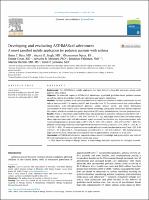Please use this identifier to cite or link to this item:
https://hdl.handle.net/20.500.12202/9821| Title: | Developing and evaluating ASTHMAXcel adventures: A novel gamified mobile application for pediatric patients with asthma |
| Authors: | Feldman, Jonathan Hsia, Brian C. Singh, Anjani K. Njeze, Obumneme Cosar, Emine Mowrey, Wenzhu B. Reznik, Marina Jariwala, Sunit P. 0000-0002-7326-3026 |
| Keywords: | Asthma |
| Issue Date: | Nov-2020 |
| Publisher: | Elsevier |
| Citation: | Hsia, B.C., Singh, A.K., Njeze, O., Cosar, E., Mowrey, W.B., Feldman, J., Reznik, M., Jariwala, S.P. (2020). Developing and evaluating ASTHMAXcel adventures: a novel gamified mobile app for pediatric patients with asthma. Annals of Allergy, Asthma & Immunology, 125, 581-588. |
| Series/Report no.: | Annals of Allergy, Asthma & Immunology;125 |
| Abstract: | •Background: The ASTHMAXcel mobile application has been linked to favorable outcomes among adult patients with asthma. •Objective: To assess the impact of ASTHMAXcel Adventures, a gamified, guideline-based, pediatric version on asthma control, knowledge, health care utilization, and patient satisfaction. •Methods: Pediatric patients with asthma received the ASTHMAXcel Adventures mobile intervention on-site only at baseline (visit 1), 4 months (visit 2), and 6 months (visit 3). The asthma control test, asthma illness representation scale --self-administered, pediatric asthma impact survey, and Client Satisfaction Questionnaire-8 were used to assess asthma control, knowledge, and patient satisfaction. Patients reported the number of asthma-related emergency department (ED) visits, hospitalizations, and oral prednisone use. •Results: A total of 39 patients completed the study. The proportion of controlled asthma increased from visit 1 to visits 2 and 3 (30.8% vs 53.9%, P ¼ .04; 30.8% vs 59.0%, P ¼ .02), and largely seen in boys. The mean asthma illness representation scale--self-administered scores increased from baseline pre- to postintervention, with sustained improvements at visits 2 and 3 (3.55 vs 3.76, P<.001; 3.55 vs 3.80, P¼.001; 3.55 vs 3.99, P<.001). The pediatric asthma impact survey scores improved from baseline to visits 2 and 3 (43.33 vs 34.08, P<.001; 43.33 vs 31.74, P<.001). ED visits and prednisone use significantly decreased from baseline to visits 2 and 3 (ED: 0.46 vs 0.13, P¼.03; 0.46 vs 0.02, P¼.02; prednisone use, 0.49 vs 0.13, P¼.02; 0.49 vs 0.03, P¼.003. Satisfaction was high with mean client satisfaction questionnaire score of approximately 30 (out of 32) at all visits. •Conclusion: ASTHMAXcel Adventures improved asthma control, knowledge, and quality of life, and reduced ED visits and prednisone use with high satisfaction scores. •© 2020 American College of Allergy, Asthma & Immunology. Published by Elsevier Inc. All rights reserved. |
| Description: | Research article / Open access |
| URI: | https://ezproxy.yu.edu/login?url=https://search.ebscohost.com/login.aspx?direct=true&AuthType=ip,sso&db=edselp&AN=S1081120620304956&site=eds-live&scope=site https://hdl.handle.net/20.500.12202/9821 |
| ISSN: | 1081-1206 |
| Appears in Collections: | Ferkauf Graduate School of Psychology: Faculty Publications |
Files in This Item:
| File | Description | Size | Format | |
|---|---|---|---|---|
| Feldman developing and evaluating OA 2020.pdf | 300.88 kB | Adobe PDF |  View/Open |
This item is licensed under a Creative Commons License

